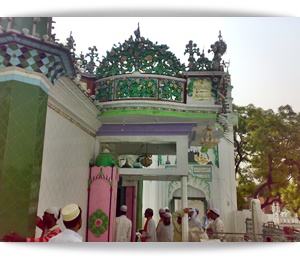|
The capital of Spiritualism This important landmark and most Sacred Muslim town is situated just outside Akbarpur (dist.Ambedkar Nagar) in the state of Uttar Pradesh in Northern India. It has become a Sacred and hallowed place by Ghaus al-Alam Mehboob-e-Yazdani Hazrat Makhdoom Sultan Sayyad Aha'huddeen Ashraf Jahangir Semnani (Radi Allahu Anho). Today the descendants of Hazrat Makhdoom Ashraf (Radi Allahu Anho).
As the history of Kicchocha Shareef reveals, Hazrat Makhdoom Ashraf (Radi Allahu anhu) was a Prince of Semnan in Iran. Born in the middle of the 12th century, he relinquished his life in search of a more spiritual one and eventually made his home in Kicchocha Shareef. He later died in the seventh decade of the 13th century at Dargah Rasulpur. 
He had come to India and stayed at Pandwa Shareef, on the way to Malda in Bengal, with Hazrat Ala al-Haq Ganj-e-Lahori Nabad, (Radi
Allahu Anho) whom he made his spiritual guide. He stayed there for 12 yrs
and received spiritual guidance and Islamic teaching. He was given the
additional name Jahangir, and was asked by his guide to travel to various
places to promote the virtues and splendour of Islam.
During his peregrinations he
met many spiritual leaders of Islam in India and Asia, and
finally came back to his spiritual guide, who directed him to search for a
place covered by water on three sides for his lifelong stay. Following the
direction of his guide and "peer", he reached the desired place -
Kicchocha Shareef. They lived at this place, now called Dargah Rasulpur in
Kicchocha Shareef, surrounded on three sides by a big lake. It's believed that
the water of this lake is sacred and has medicinal value. This shrine is also
considered powerful especially for the treatment of mental illness.
People from every part of Asia and the world make pilgrimages to this sacred place to
drink the water and be cured of ailments. They also take the holy water to
their homes. The tomb of Sultan Sayyad Makhdoom Ashraf Jahangir (Radi
Allahu anhu) was constructed 16 years before his death in 808 Hijri.
Every year
around Muharram, the Urs, death anniversary of Hazrat Sultan Sayyad
Makhdoom Ashraf Jahangir (Radi Allahu anhu) is organized by his
descendants, Khanwada-e-Ashrafiya. More than four hundred thousand
pilgrims (including non-Muslims) from different parts of India, Pakistan, Bangladesh, Sri Lanka, Europe, S.
Africa and America gather here on this occasion. Two-thirds of the total population of Kicchocha Shareef, are Muslims, the rest being Hindus. The Muslim population is classified into three groups: (1) Peer Zadagan, the descendants of Hazrat Makhdoom Ashraf Jahangir (Radi Allahu anhu) considered priests and religious guides, who are managers of the dargah; (2) Khadim, those who assist pilgrims in the performance of rituals and make arrangements for their stay, (3) Mujavir or Mazavi, servants of the dargah, whose function is to keep the place clean, and to open and close the door of the dargah at the appointed times. There are also artisans and businessmen who interact with the pilgrims.
|